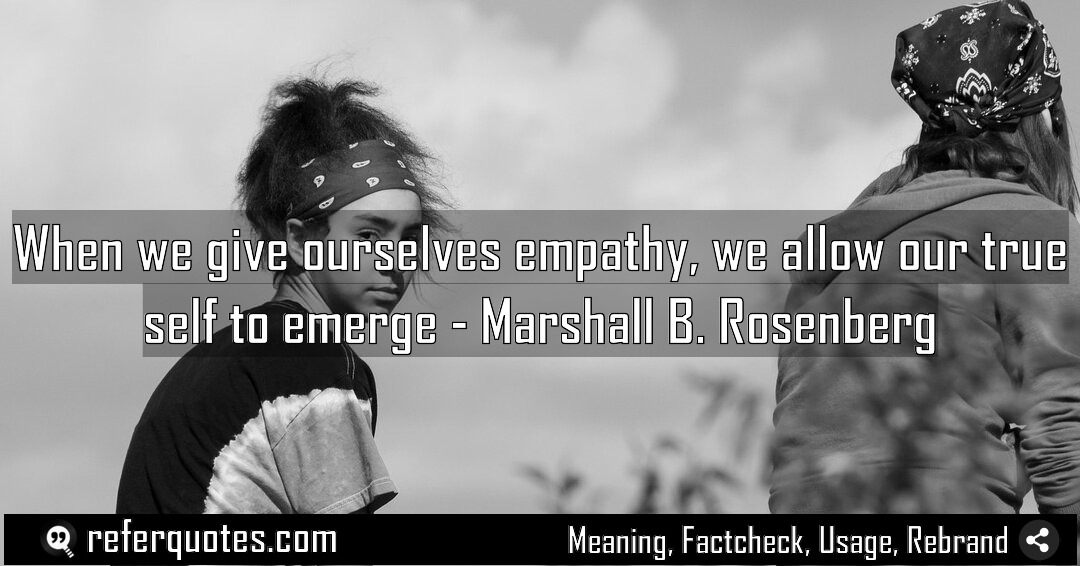
When we give ourselves empathy, we allow our true self to emerge. It’s about creating a safe space internally, so your authentic self can finally show up without fear or judgment.
Share Image Quote:
Table of Contents
Meaning
Self-empathy isn’t self-pity; it’s the act of listening to your own feelings and needs with the same compassion you’d offer a dear friend.
Explanation
Here’s the thing I’ve seen over and over. We’re so often at war with ourselves, right? We criticize, we judge, we push down our own feelings. It’s exhausting. What Rosenberg is pointing to is that when you stop that internal battle—when you just listen to that part of you that’s scared or angry or hurt, without trying to fix it or shove it away—something incredible happens. The armor comes off. The defenses drop. And what’s left is the real you. The you that isn’t performing or pretending. It’s a profound shift from self-criticism to self-connection.
Quote Summary
Reading Level75
Aesthetic Score80
Origin & Factcheck
This is straight from Marshall B. Rosenberg’s 1999 book, Nonviolent Communication: A Language of Life. It’s a core tenet of his NVC process. You won’t find it correctly attributed to anyone else; this is pure Rosenberg, developed through his work in conflict mediation starting in the 1960s in the United States.
Attribution Summary
Where is this quotation located?
| Quotation | When we give ourselves empathy, we allow our true self to emerge |
| Book Details | Publication Year: 1999; ISBN: 9781892005038; Last edition: 3rd Edition (2015); Number of pages: 264. |
| Where is it? | Chapter 9: Connecting Compassionately with Ourselves, Page 153 (2015 edition) |
Context
In the book, this isn’t some fluffy self-help idea. It’s presented as a prerequisite. Rosenberg argues that you can’t genuinely offer empathy to others if you’re incapable of giving it to yourself first. It’s the foundational practice that makes everything else in Nonviolent Communication possible.
Usage Examples
Let me give you a couple of real-world ways this shows up. Imagine a manager who’s just had a tough conversation with an employee and is now beating themselves up. Instead of spiraling into “I’m a terrible leader,” they might pause and say to themselves, “Wow, I’m feeling really anxious and regretful because I need respect and competence in my team.” That’s self-empathy. It changes the entire internal dialogue. Or a parent who snaps at their kid. Instead of a guilt trip, they get curious: “I’m feeling overwhelmed and my need for peace isn’t being met.” This is gold for leaders, parents, creatives—anyone who ever feels that inner critic kick in.
To whom it appeals?
Share This Quote Image & Motivate
Motivation Score85
Popularity Score82
Shareability Score80
FAQ
Question: How is this different from just making excuses for my behavior?
Answer: Great question. It’s the opposite. An excuse bypasses responsibility. Self-empathy has you fully acknowledge your feelings and the impact of your actions, which actually creates a clearer space to take responsibility from a place of self-awareness, not self-loathing.
Question: But isn’t focusing on my own feelings selfish?
Answer: It seems counterintuitive, but no. It’s like the oxygen mask on a plane. By meeting your own needs for understanding first, you fill your cup. You then have more genuine, less resentful energy to care for others. It’s the least selfish thing you can do.
Question: What’s a simple first step to practice this?
Answer: The next time you feel a strong, difficult emotion, just try to name it. And then get curious. Ask yourself, “What important need of mine is not being met right now?” Don’t judge the answer. Just listen. That’s the beginning.
Similar Quotes
Our ability to offer empathy can allow us to stay vulnerable… it sounds simple, but this is the secret sauce to defusing conflict and creating real connection. It’s about disarming…
When we stay with empathy, we allow others to fully express themselves. It’s a game-changer because it removes the fear of judgment. This simple shift transforms how we connect with…
When we meet others with empathy, we transcend our judgments… It’s a game-changer because it shifts the entire dynamic of a conversation from conflict to connection. You stop seeing people…
When we are in pain, empathy is what helps us reconnect to life. It’s a simple but profound truth about how we heal from emotional hurt. This isn’t about fixing…
We are compassionate with ourselves when we… stop fighting our own humanity. It’s about embracing every part of who we are, even the messy bits, to find the real needs…
